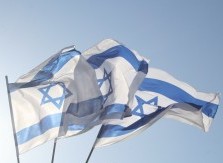
Israel will mark 50 years of Jerusalem’s reunification in 2017. Israeli flags. Illustrative. By Joshua Spurlock
The Palestinians and even groups within the United Nations might try to deny Israel’s 3,000-year-old connection to the Old City of Jerusalem—but despite all of this Israel will be celebrating the 50th anniversary of the reunification of their capital city in 2017. In the next couple weeks, the ministry in charge of the festivities will be updating the Israeli national cabinet of the opening event plans and unveiling the Jerusalem anniversary logo, Culture and Sports Minister Miri Regev announced on Sunday.
“As we recall, a few weeks ago a ridiculous, false and unfounded decision was made by UNESCO, that there is no connection between the Jewish People and the Western Wall and the Temple Mount,” said Regev in comments released by the Prime Minister’s Office. “Thank G-d, they can continue to lie, we will continue with the truth of history.” The Israeli calendar date for the anniversary, which is commonly known as Jerusalem Day, will begin on the evening of May 23 next year.
Israel retook the Old City of Jerusalem, including the Western Wall and the Temple Mount, from the nation of Jordan in the 1967 war on June 7.
On Sunday, Israeli Prime Minister Benjamin Netanyahu recollected his childhood memories of the divided city. “We Jerusalemites lived under the fear of sniper fire—war in the heart of Jerusalem. The city was divided by barbed wire fences and snipers and the latter—from time to time—claimed a price from the residents of the city,” he said in comments published by his office.
“The liberation of the city changed this situation from its foundation. Jerusalem stopped being a city on the edge and became the capital of Israel—broader, vibrant and being built up. This is a great event in Jewish and Zionist history and we will celebrate it accordingly.”
Regev highlighted some recent archaeological discoveries as examples of the long-standing connection between Israel and Jerusalem—including an ancient street set to be unveiled during the Festival of Hanukkah that begins on the evening of December 24. Regev said it is “one of the oldest streets in Jerusalem” where the heroes of the Hanukkah story, the Maccabees who liberated Israel from Greek rule, walked more than two millennia ago.
The street held ancient shops and was used by Temple pilgrims as they went up from the Pool of Siloam to the Temple Mount. While the unveiling will come 6 months prior to 50-year Jerusalem anniversary, it nonetheless reemphasizes Israel’s historical link to the city.
“I see this project of uncovering the Old City, of continuing to excavate in the Old City, as an important national project of the State of Israel and certainly of the Ministry of Culture,” said Regev.
In his comments on Sunday, Netanyahu noted that Israelis are connected not just to Jerusalem, but to all the Land of Israel. He cited multiple Biblical sites, such as Beersheba and Hebron, as examples.
“There is nothing that can erase this connection,” said the Israeli leader. “But what we do in the anniversary—we will strengthen it, and I expect our relationship, and the international understanding of our relationship, to our land and especially our capital, will be greatly strengthened in the anniversary year.”
(By Joshua Spurlock, www.themideastupdate.com, December 11, 2016)
